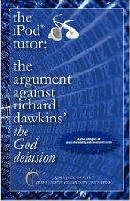Debunking Dawkins: The God Delusion
Chapter 4: Why There Almost Certainly Is No God

Introduction
The fourth chapter of The God Delusion is what Richard Dawkins considers to be his most convincing argument that no gods exist. He calls this argument the "Ultimate Boeing 747 gambit." Dawkins asserts that the "The argument from improbability, properly deployed, comes close to proving that God does not exist." However, as we shall see, Dawkins' argument is formally fallacious. Dawkins, of course, believes that evolution (biological or cosmological) can explain all of nature, and presents arguments to support his views in this chapter.
The Ultimate Boeing 747
The Boeing 747 allusion is from Fred Hoyle's famous argument against the probability of life spontaneously assembling itself on the primordial earth. According to Hoyle, the probability of life originating on Earth is no greater than the probability that a tornado, sweeping through a junkyard, would assemble a working Boeing 747 airliner. However, Dawkins turns the argument around, and concludes that any designer must be even more improbable:
However statistically improbable the entity you seek to explain by invoking a designer, the designer himself has got to be at least as improbable. God is the Ultimate Boeing 747.
Dawkins does not present the argument formally, but here it is extracted from the few sentences he actually devotes to the argument:
- Premise #1. Every existing entity that shows evidence of design requires a designer superior to itself
- Premise #2. God shows evidence of design in himself
- Conclusion #1. Hence God requires a designer (another God) superior to himself
Argument #2:
- Premise #3. Infinite regressions are not possible
- Conclusion #1 implies an infinite regression (an infinite number of gods)
- Conclusion #2. Hence, Conclusion #1 is not possible, so no god can exist
Although Dawkins does not believe that premise #1 is true, he accepts it as such, supposedly being a premise that all theists would accept as true. However, theists make no such claim that all possible entities require design. Specifically, we can't know for sure if God shows evidence of design, since He is not even a physical entity (God is a spirit1). The proof that the first premise is false can be shown by using it against Dawkins' own preferred universe designer - the multiverse. Here is Dawkins' argument turned against itself:
- Premise #1. Every existing entity that shows evidence of design requires a designer superior to itself
- Premise #2. The universe shows evidence of design in itself
- Conclusion #1. Hence the universe requires a designer (a multiverse) superior to itself
Argument #2:
- Premise #3. Infinite regressions are not possible
- Conclusion #1 implies an infinite regression (an infinite number of universes)
- Conclusion #2. Hence, Conclusion #1 is not possible, so no universes can exist
Obviously, the universe does exist, so there must be something wrong with Dawkins' argument! Dawkins argument falls flat because premise #1 is false. Entities can be either contingent or necessary. The Creator (or creator) of the universe is a necessary entity and is not contingent upon anything nor requires a designer. This must be true or no universe would exist at all. So, Dawkins' argument is formally fallacious. Dawkins' failure to distinguish between necessary and contingent entities also assumes that cause and effect operates upon all entities. However, the evidence indicates that time itself began at the beginning of the Big Bang.2 Without the existence of time, cause and effect do not operate. So, whatever or Whoever created the universe lies outside of time and space and has "always" existed. What was Dawkins thinking? (or was he?)
Natural selection as a consciousness-raiser
To be continued...
Irreducible complexity
The worship of gaps
The anthropic principle: planetary version
The anthropic principle: cosmological version
An interlude at Cambridge
Conclusion 
Richard Dawkins' Ultimate Boeing 747 argument is shown to be formally fallacious, since premise #1 (every existing entity that shows evidence of design requires a designer superior to itself) is shown to be false. Applying Dawkins' own argument to his favorite universe designer (the multiverse) would show that no universe exists, if the argument were valid. Obviously, we have observational evidence that contradicts this hypothesis.
<< Previous Debunking Dawkins: The God Delusion Chapter 3: Arguments For God's Existence
Next >> Debunking Dawkins: The God Delusion Chapter 5: The Roots Of Religion
Debunking Dawkins: The God Delusion
Ch. 1 | Ch. 2 | Ch. 3 | Ch. 4 | Ch. 5 | Ch. 6 | Ch. 7 | Ch. 8 | Ch. 9 | Ch. 10
Related Pages 
- Is God Real? Does Science Answer "Is There a God?"
- If God Created Everything, Who Created God?
- God of the Gaps - Do All Christian Apologetics Fall Into This Kind of Argument?
- Book Review: What's So Great About Christianity by Dinesh D'Souza
- Flew Speaks Out: Professor Antony Flew reviews The God Delusion
Related Resources 
References 
- But He said, "You cannot see My face, for no man can
see Me and live!" (Exodus 33:20)
When He passes me I cannot see Him. When He goes by, I cannot perceive Him (Job 9:11)
The Almighty is beyond our reach (Job 37:23)
No man has seen God at any time... (John 1:18)
No man has seen the Father... (John 6:46)
And He is the image of the invisible God, the first-born of all creation. (Colossians 1:15)
Now to the King eternal, immortal, invisible, the only God... (1 Timothy 1:17)
God... whom no man has seen or can see... (1 Timothy 6:16) ...Him who is unseen. (Hebrews 11:27)
God is spirit, and those who worship Him must worship in spirit and truth. (John 4:24) - Professor Stephen Hawking, The Beginning of Time
http://www.godandscience.org/apologetics/the_god_delusion4.html
Last Modified May 9, 2007






